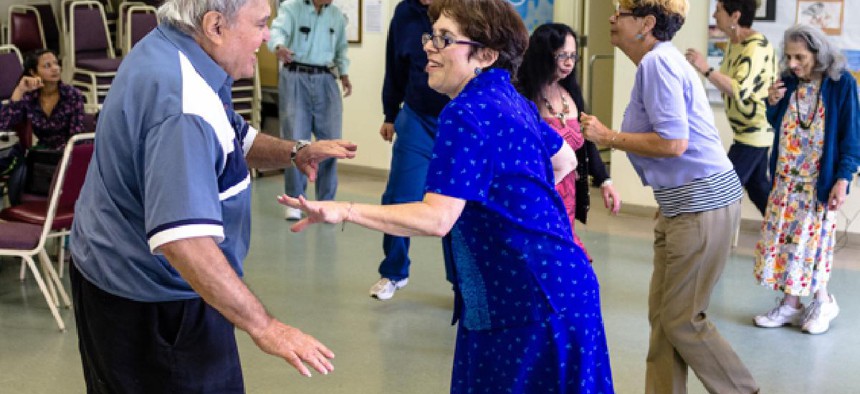Serving the most diverse urban area on the planet

With executive orders from President Donald Trump already affecting immigrant communities, nonprofit social service agency Queens Community House is welcoming immigrants, providing essential services to all ages and promoting social reform. Queens is, after all, the “most ethnically diverse urban area on the planet,” according to the Guinness Book of World Records.
“QCH wants to be at the forefront of making Queens a place of acceptance,” said Ben Thomases, its executive director since 2015. People who harbored negative sentiments and were shamed into silence have recently started acting out, Thomases said. “Our position is to help these people understand the pain they’re causing,” he said. “We will provide a safe space for those who feel threatened and address this increase in hate speech and crime head-on. This type of action is at the core of who we are.”
Half of QCH’s current population was born overseas and speaks a language other than English. Thomases now seeks a higher level of cultural competence among his staff and has become more intentional about hiring people who have the language and cultural skills needed to work with newer populations. “As our neighborhoods have become more diverse, our programs have had to adapt to meet the needs of changing demographics,” he said.
Each year, the settlement house serves 20,000 visitors from kindergarten through older adults. It also operates the only gay senior center in the borough. Youth services range from after-school programs to teen centers, including a break dancing center and an after-school drop-in center for LGBTQ students. For high school graduates, QCH offers programs in workforce development and is one of the largest youth employers in the borough. The nonprofit also operates the largest eviction prevention program in the borough, which handles a growing number of cases due to the city’s current housing crisis.
“Our human services sector is fragmented, leaving families in need struggling to navigate complex systems to find help,” said Dennis Redmond, who has been the chief strategy officer at Queens Community House for more than 20 years. “Our society is divided with a resurgence of hate speech focused on blaming people who are different for problems instead of coming together to find solutions. Settlement houses are an important response to both of these challenges.”
Launched in 1976 as Forest Hills Community House with a staff of three and a board of local residents, it rebranded as Queens Community House 10 years ago to better reflect its 25 program sites in 11 neighborhoods throughout the borough. Today, QCH operates with a budget of $16 million and a staff of 350 full- and part-time employees, of whom 80 percent are recruited from within its community. Thomases holds a master’s degree in business administration from Columbia University and served as food policy administrator in Mayor Michael Bloomberg’s administration. He also serves on the board of the New York City Employment and Training Coalition.
“Most of our programming helps to meet fundamental individual and family needs, which transcend culture, so our basic program portfolio has not changed substantially,” said Dennis Redmond, chief strategy officer at Queens Community House. “About 20 years ago, (QCH) recognized the growing need for certain services, such as ESOL and immigration legal services, so we added them. The demand for these services far outpaces the funding for them, however, so we continue to advocate for greater support in these areas.”
“Our mission has always been about bringing neighbors together across differences, so responding to the changes, while challenging, is always an opportunity,” Redmond said.
QCH staff makes a focused effort to engage with the entire community. “When our staff observed Chinese residents traveling to senior centers outside our area, they invited them in and welcomed them into our programs,” Redmond said. “As a neighborhood-based organization, the trust we have built allows us to bring neighbors together, to help them see their common humanity, define shared interests and goals and begin to reweave the social fabric that has come undone.”
Part of that reweaving involves forming creative partnerships. In November 2016, QCH partnered with Resorts World Casino in Jamaica, Queens, which hosted a show of oil paintings produced by 14 talented retirees from its Pomonok Senior Center in Flushing. The exhibition was featured on NY1, and one artist’s work was solicited for showing in a federal building in Washington, D.C.
QCH also works to engage residents as change agents. When QCH took over the Pomonok Community Center 11 years ago, a community-needs assessment identified a lack of access to fresh food. Before long, a farmers market was set up on the premises with a produce bag program that continues to be run by local volunteers.
For 2017, Thomases plans to develop the Pomonok Community Center into a trusted community resource that offers a full range of services under one roof. The concept may seem simple, but implementation will require a concerted effort.
“I’ve worked at city government and understand how complicated life can become when families are seeking help and our staff has to refer them elsewhere rather than providing the answers,” he said.
Consequently, the No. 1 challenge for QCH is finding and affording space. “A lot of nonprofits struggle with rent,” Thomases said. “We want to keep all our programs under one roof and for that we need a roof – and the resources to keep it over our heads.”
Note: This story is the full version of an article that ran in this week's issue of our sister publication, City & State.
NEXT STORY: 2017 state legislative preview
